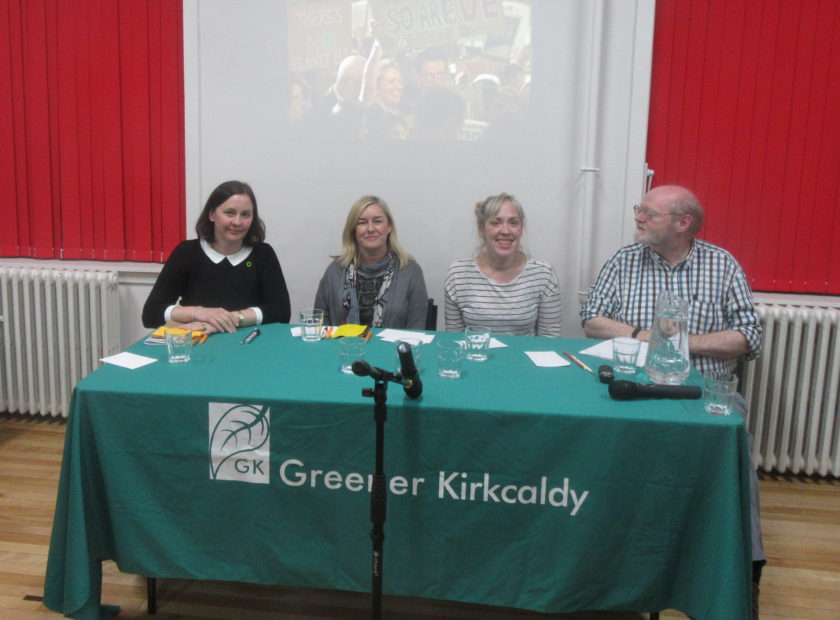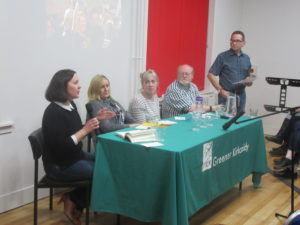Greener Kirkcaldy AGM Climate Change Discussion Panel

We held a discussion panel on Climate Change as part of our 2019 AGM. The panel was led by Dr. Richard Dixon, Director of Friends of the Earth Scotland. Richard became Director of Friends of the Earth Scotland in early 2013 and has been very involved in the campaigns against fracking and for strong action on climate change. He helped set up Transform Scotland and Stop Climate Chaos Scotland, and serves on the boards of Postcode Culture Trust and SEPA, and is a former Chair of the Edinburgh Community Solar Co-operative.
Richard was joined by panel members in a discussion on Climate Change:
- Jess Pepper, Climate Reality Leader
- Karen Dorrat, EATS Rosyth
- Catherine Payne, Environmental Strategy Officer, Resource Efficient Solutions
All panel members gave some reflections from being inspired by children and young people finding their voice on Climate Change and how we all need to raise our voices; the systems we live with need to make tackling Climate Change easier and normalised, and it’s important that people in Fife engage with ‘Climate Fife’, a Sustainable Energy and Climate Action Plan (SECAP) which is being consulted on until 9th December 2019.
The discussion kicked off on the topic of reducing plastic waste, packaging and the role of supermarkets in helping consumers reduce – ‘how can local suppliers enter the High Street?’ and ‘how can we protect non-chain shops’. While supermarkets are starting to wake up to reducing plastic waste, they have been slow to respond initially. If an individual or business do something different, we need to tell people about it. We all need to be braver about speaking up and trying to get what we want and need. Participants highlighted some great examples from Burntisland, where there has been a return of a grocer shop, a fish shop, and a Zero Waste Plastic Free refill shop.
 Discussion turned to the merits of plastic versus paper – paper is not always the most environmental option. Substitutes can create more carbon, but can protect marine pollution. The global supply of food is complex in terms of food miles and providing livelihoods – we need to transition and consider people’s abilities to make a living too. Do we need to just stop buying and accumulating more stuff?
Discussion turned to the merits of plastic versus paper – paper is not always the most environmental option. Substitutes can create more carbon, but can protect marine pollution. The global supply of food is complex in terms of food miles and providing livelihoods – we need to transition and consider people’s abilities to make a living too. Do we need to just stop buying and accumulating more stuff?
What are the economic benefits of being more environmentally friendly? Do these impacts need to be discussed more? Can we tell people more about the benefits of transitioning from old ways to new ways? This can help grow people, as well as having economic benefits. The impact on our well being by being involved and doing things differently is a good narrative. The future might be very different but it doesn’t need to be bad, and the quality of our lives could be better.
Local authorities have less funding than cities to make big impact changes. There can be fears around being criticised for telling people what to do and not doing enough. However, Local authorities can help shape our lives and set structures in place to influence what we can do. These structures need to be accessible to all, and show that they will benefit everyone, and not just a few. There are always tensions around priorities locally – what people say they want and need in the long term. No one wants to fail, but local authorities don’t always know what to do. Our voices in helping to shape actions are important. The SECAP plan has 3 core principles – Climate Ready, Climate Friendly, and Climate Just (focusing on equalities). Some parts of our community are more vulnerable and less resilient to climate change impacts. Solutions need to apply to, and help, everyone from being able to grow food, access good food, access better and affordable energy choices, access effective transport systems, have better air quality,and so on.
Everyone agreed that greener choices are better choices, but the opportunity of choice is not the same for everyone. Community projects like EATS Rosyth and Greener Kirkcaldy run wide ranges of activities locally, from growing, to reducing waste, to cooking skills, that are accessible to all communities.
We talked about maximising momentum – more people are becoming aware of climate change, through TV programmes, social media, strikes and marches. We need to keep this going, especially in the run up the summit in Glasgow next year.
Read a summary of the report from the Greener Kirkcaldy 2019 AGM.
|